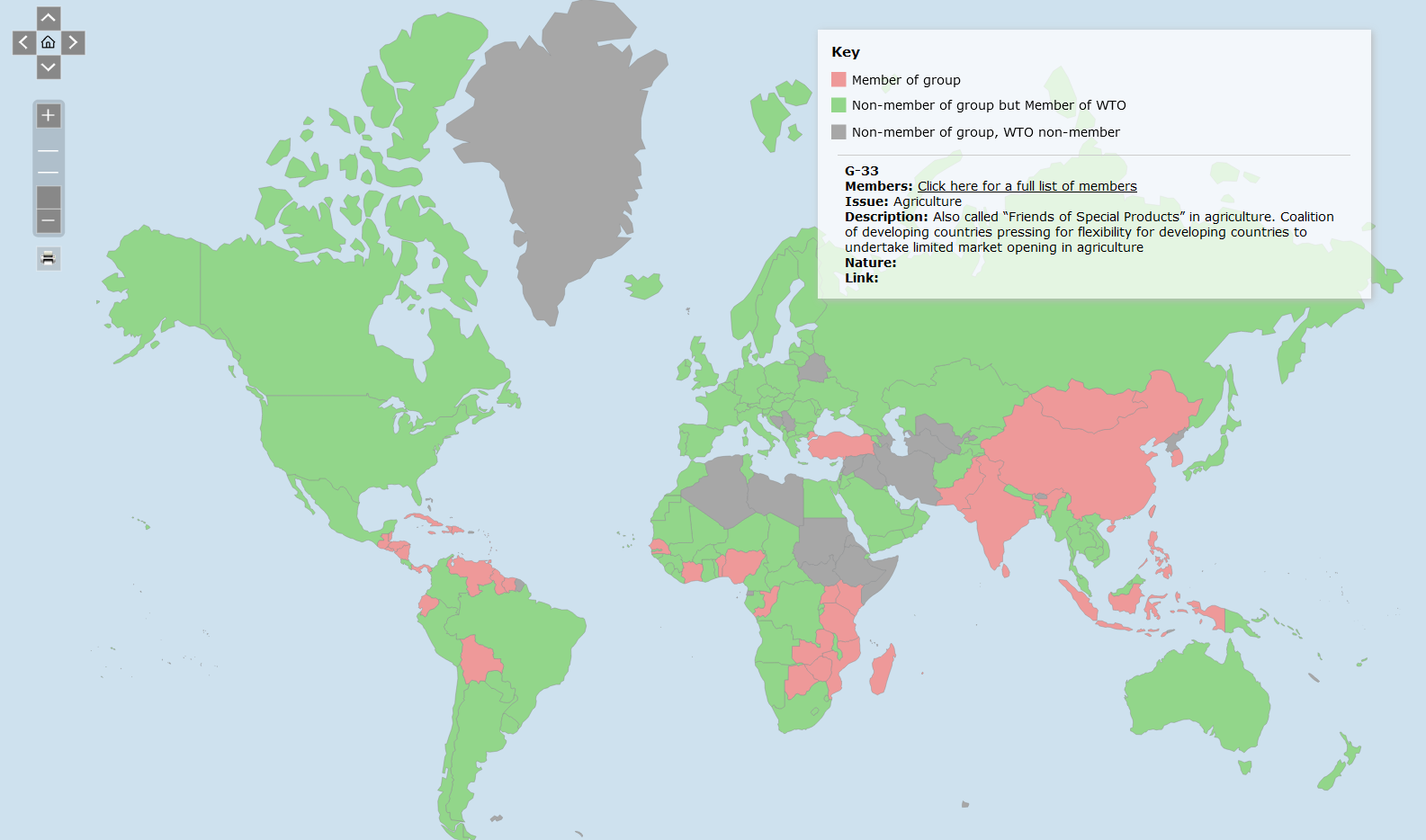Free Courses Sale ends Soon, Get It Now


Free Courses Sale ends Soon, Get It Now



Copyright infringement not intended
Picture Courtesy: https://tradebetablog.wordpress.com/2020/08/24/rhetoric-public-stockholding-wto/
Context: The G-33, a group of developing nations, calls for a permanent solution to allow them to maintain public stockholding programs for food security purposes.
Details
Call for Permanent Solution to Public Stockholding for Food Security
|
Public Stockholding for Food Security |
||
|
Key Points |
Explanation |
Significance |
|
Definition |
Government programs that involve buying, storing, and distributing food staples. |
Ensures food availability and affordability, especially during times of scarcity. |
|
Mechanisms |
Procurement: Buying food from farmers at guaranteed prices, supporting their livelihoods. Storage: Maintaining stocks in warehouses to address shortages and price fluctuations. Distribution: Selling or distributing food to vulnerable populations or through market interventions. |
Offers flexibility to respond to different food security needs. |
|
Benefits |
Food security: Provides a buffer against food shortages and price spikes, reducing vulnerability. Price stabilization: Helps manage market volatility, ensuring predictable prices for consumers and producers. Farmer support: Guarantees minimum prices and incentivizes production, particularly for staple crops. Rural development: Investments in storage facilities and distribution infrastructure can boost rural economies. |
Plays a crucial role in promoting food security, price stability, and rural development in developing countries. |
|
Challenges |
Potential trade distortion: If not managed carefully, stockholding can create unfair competition in international markets. Costly to implement: Requires significant financial resources for procurement, storage, and distribution. Risk of corruption and inefficiency: Requires transparent and accountable governance to avoid misuse of resources. |
Needs to be implemented in a way that minimizes trade distortions and is cost-effective and transparent. |
|
International perspective |
WTO rules: Public stockholding can be subject to limitations under certain WTO agreements, which can create challenges for developing countries. Negotiations: The G-33 and other developing countries are seeking a permanent solution at the WTO that allows them to maintain public stockholding programs for food security purposes. |
Developing countries advocate for flexibility in WTO rules to ensure their ability to implement effective food security programs. |
Key Highlights of the Statement Released by the G-33 Countries
|
Key Concerns of G-33 Nations |
||
|
Issue |
G-33 Position |
Importance for Developing Countries |
|
Public Stockholding for Food Security |
Demand a permanent solution, not temporary or provisional agreements. |
Ensures food availability: Governments can procure food during surplus, creating stocks to bridge the gaps during shortages. Protects farmers: Guaranteeing minimum prices stabilizes incomes and incentivizes production. Supports rural development: Programs often have focused spending in rural areas, fostering economic opportunities and poverty reduction. |
|
Lack of Progress in Negotiations |
Express deep disappointment with slow progress and unfulfilled mandates. |
Frustration: Highlights the continued gap between the needs of developing countries and the pace of reform in the WTO system. Development Goals: Stalled negotiations hold back progress in achieving food security and broader development objectives in the Global South. |
|
Special Safeguard Mechanism (SSM) |
Advocate for a decision on SSM by the next WTO conference. |
Protection from Volatility: SSM acts as an insurance mechanism against damaging price drops or import surges, often caused by subsidies in developed countries. Domestic Market Stability: Protects farmers and rural economies from sudden shocks that would undermine investment and destabilize local markets. |
|
Special and Differential Treatment (SDT) |
Emphasize the importance of preserving SDT within WTO agreements. |
Level Playing Field: Acknowledges differences in development levels, economic capacity, and infrastructural needs between developed and developing countries. Tailored Policies: Allows developing countries to adopt policies that promote industrialization, protect vulnerable sectors, and address specific domestic challenges. |
|
Non-Trade Concerns |
Stress the need to prioritize non-trade concerns in negotiations. |
Sustainable Development: Ensures trade liberalization doesn't undermine food security, farmer livelihoods, or environmental protection. Ethical Concerns Prioritize human well-being and societal impacts over purely economic gains from trade. |
Conclusion
Must Read Articles:
WTO FARM SUBSIDIES ISSUE: https://www.iasgyan.in/daily-current-affairs/wto-farm-subsidies-issue
|
PRACTICE QUESTION Q. Which of the following is the primary objective of the G-33 coalition at the WTO? A) Securing exemptions from intellectual property rights for pharmaceuticals. B) Promoting greater market access for textile and apparel exports. C) Protecting the ability to use public stockholding programs for food security. D) Reducing tariffs on industrial goods to increase manufactured exports. Answer: C Explanation: The G-33's main focus is securing flexibility within WTO agreements for developing countries to maintain public stockholding programs. These programs are crucial for food security by ensuring the availability of staples at affordable prices, especially for vulnerable populations. |
© 2024 iasgyan. All right reserved